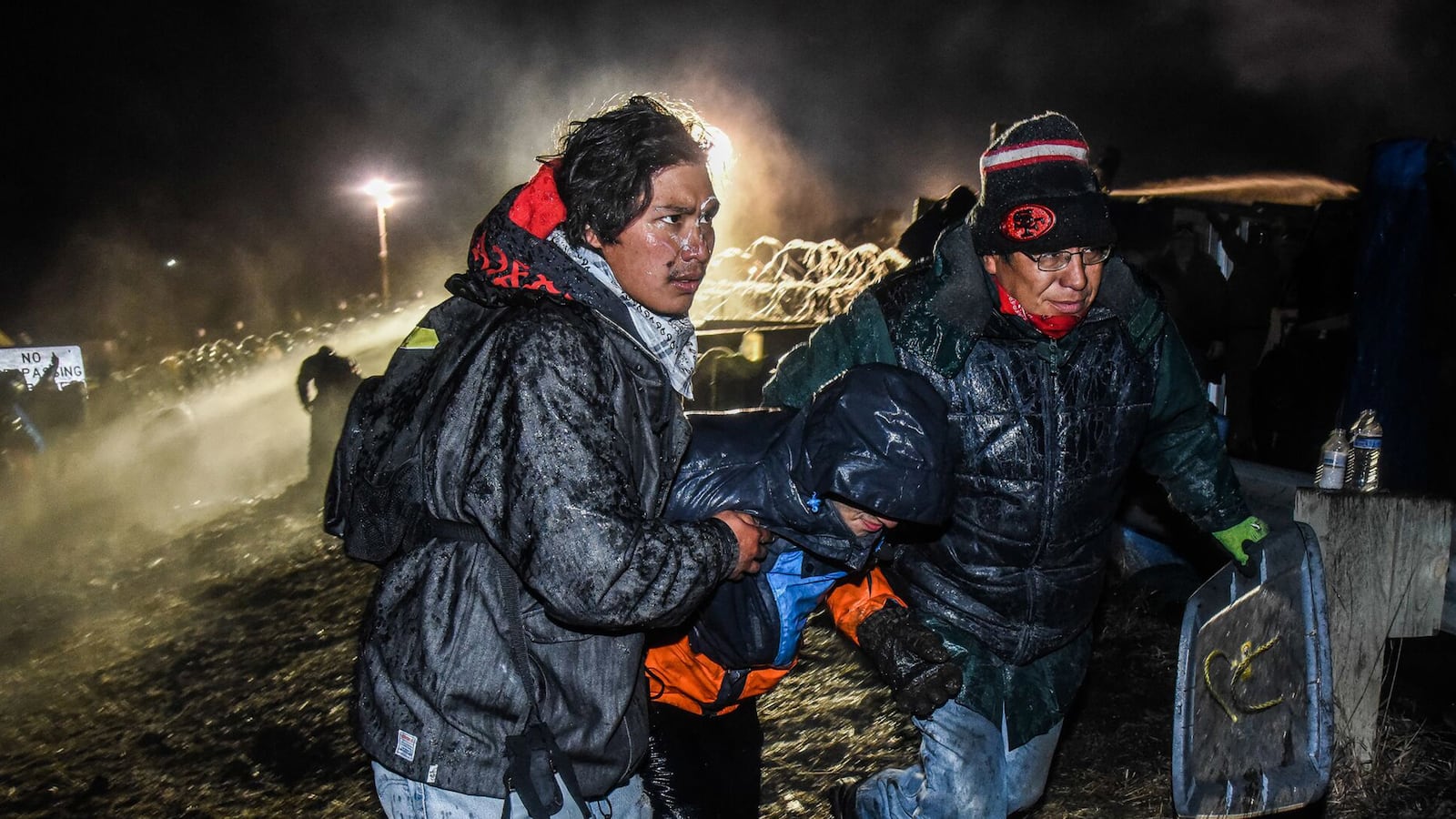Photos Courtesy of Avery White
CANNONBALL, North Dakota—Though the night would soon be marked by tear gas and water cannons shooting through barbed wire and concrete barriers, at the beginning of the gathering held on Sunday evening under the floodlights of the Dakota Access Pipeline construction site, the air was permeated by the sound of prayer and the unmistakeable scent of the sage smoke billowing above the road.
To the Standing Rock “water defenders,” an unflagging devotion to prayer has been the continuous thread in the tumultuous, months long stand-off between the authorities supporting Energy Transfer Partners, the company in charge of constructing the pipeline, and the Lakota of the Standing Rock Reservation and their allies. While those opposing DAPL are certainly determined to prevent the construction of the pipeline underneath the Missouri River less than a mile from the reservation, throughout the main camp of Oceti Sakowin the signs strictly prohibiting the use of any weapons (or anything which can be perceived as such) demonstrate an equal commitment to nonviolence.
This did little to prevent a rapid escalation on the part of the authorities. Though the spiritual ceremonies continued throughout the night around a small fire lit to warm the natives and their allies as temperatures dropped well below freezing, the sound of screams quickly drowned out the prayers. Although authorities claimed water cannons were only used to put out fires set by protestors, the one small fire on the road was well out of the way of the barricade, and the other, where medics treated the residents of Oceti Sakowin who had no access to hot running water or medical facilities, was separated from the melee by a valley running along the road.
Amid allegations that aggressive protesters were attempting to attack the law enforcement line, hundreds of unarmed people were successively tear-gassed and blasted with high pressure water hoses.
“I was tear gassed over 15 times, which made it hard to breathe and left my face burning for hours. I got hosed down with a water cannon in freezing temperatures leaving me hypothermic, and I was slammed into a barbed wire barricade out of panic caused by the police after a flash grenade was thrown and caught fire to a field,” said Cheyenne, a young native woman from Michigan, whose face was streaked with tear gas, and whose eyes were red and swollen.
Another young native man from the Ojibwe nation, reports being openly targeted by a police officer using “non-lethal” weapons to cause serious harm.

“He shot me with a rubber bullet right in the belly button, and when I showed him that he had hurt me, he just smiled and shot both my kneecaps,” he said.
As the night wore on, ice from the water canons enveloped the barbed wire and glistened under the floodlights. Helicopters circled ominously overhead, and from the hill which sloped away from the road the red lights of police cars grew increasingly numerous. In spite of the hostility, the water defenders continued to hold their ground, in an attempt to communicate their message to those who opposed them. Smiles For The People, a young woman who was maced throughout the night, insisted that in spite of her injuries, she wouldn’t give up.
“I’m here to protect the water and make sure that DAPL and the workers all know that without water we can’t live—water is sacred, you can’t drink oil,” she said. “What they’re doing is morally wrong in every respect.”

Others close to the barricade chanted into loudspeakers, hoping to reach the people on the other side.
“We are protecting you! You are protecting oil and we are protecting you. You will be drinking the same clean water as us when we shut this thing down!”
On Monday, Standing Rock water defenders gathered again on Highway 1806, though some of them are still recovering from the night before. On the other side of the barrier are armed police and tanks, and officers are repeatedly threatening arrest for criminal trespassing, though the road is technically public property. The defenders intend to continue to stand their ground, in spite of the exhaustion and extreme cold.






